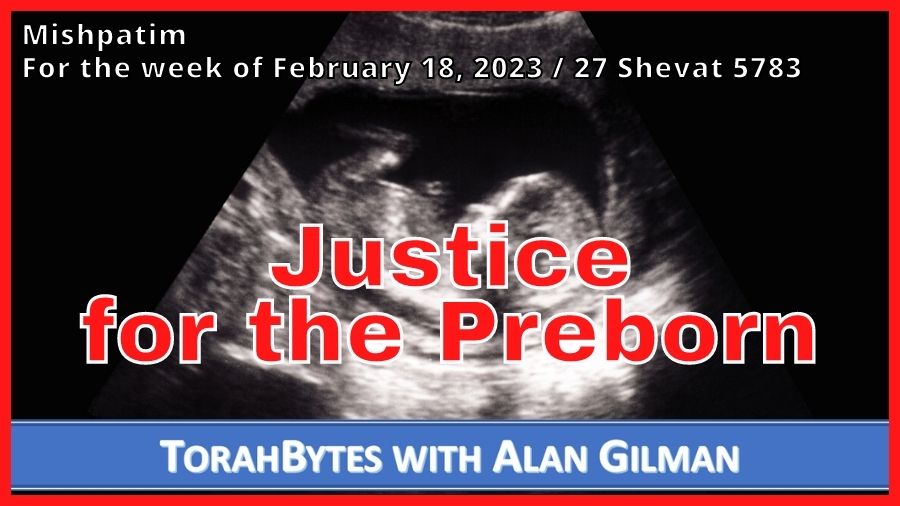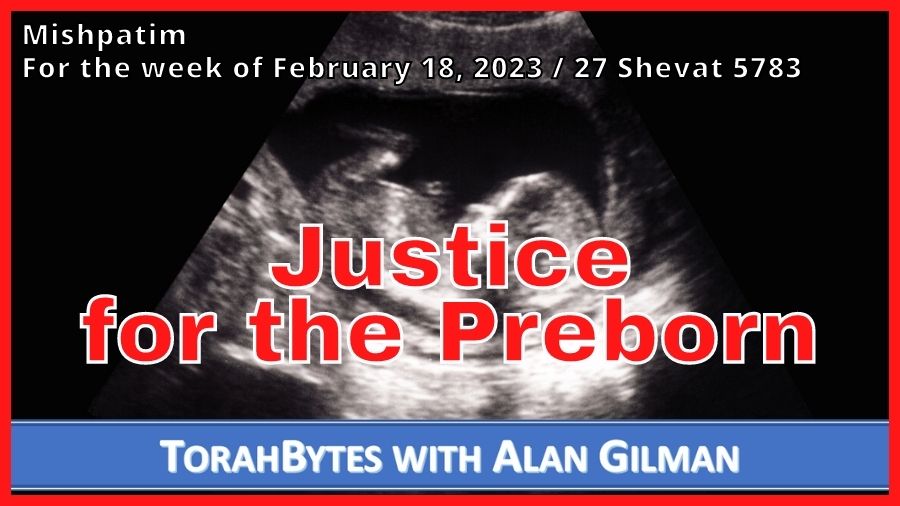
Justice for the Preborn
For the week of February 18, 2023 / 27 Shevat 5783

Mishpatim
Torah: Shemot/Exodus 21:1 – 24:18; 30:11-16
Haftarah: 2 Melachim/2 Kings 12:1-17
Download Audio [Right click link to download]
When men strive together and hit a pregnant woman, so that her children come out, but there is no harm, the one who hit her shall surely be fined, as the woman’s husband shall impose on him, and he shall pay as the judges determine. But if there is harm, then you shall pay life for life, eye for eye, tooth for tooth, hand for hand, foot for foot, burn for burn, wound for wound, stripe for stripe. (Shemot/Exodus 21:22-25)
The other day, I was copied on an email conversation between some Christian leaders on a prolife issue. It contained a brief comment about the religious Jewish view of abortion being similar to theirs, which would be protection for all human beings from conception to natural death. Realizing that the Jewish view is far more nuanced than this, I wanted to send them a clarification. Just to be sure I was articulating the religious Jewish view correctly I double checked some online resources, one of which is the article Abortion and Judaism on the “My Jewish Learning” website.
Note that I have referred to the religious Jewish view. Most Jewish people would not consider themselves strictly religious and would, generally speaking, view such an issue in a similar manner to the majority view in the culture. As for religious Jews, a key aspect of their perspective on the subject is that the fetus doesn’t become a person until the first breath. That doesn’t mean the fetus is of no value until then, but it is viewed in a lessor way than fully born individuals.
Part of this discussion involves the fact that there are not many explicit references in Hebrew Scripture addressing this issue. Be that as it may, I assert that King David establishes the womb as a sacred place that should be protected when he writes: “For you formed my inward parts; you knitted me together in my mother’s womb” (Psalm 139:13).
There does appear to be one passage in the Torah, the one I quoted at the beginning, that does explicitly address the value of the preborn. Here is a situation where a pregnant woman is apparently hit by accident due to some men fighting. It’s a fascinating passage with regard to personal liability when a bystander, in this case a women, is potentially harmed in a scuffle. We won’t go into all the details involving her, but instead simply focus on the ramifications for the preborn. As you may see in the article I referred to earlier, the rabbinic interpretation of this passage is that the “life for life” penalty is deemed not to apply to the children, but may only result in a monetary fine upon the one committing the infraction.
That conclusion is not reasonable given what is described in the passage. While it may not say who exactly is suffering harm, there is no reason to assume it is exclusively the mother. Note that at this point the children are no longer in the womb. Their welfare is as observable as the other parties involved. It is clear then that should the mother and/or children be harmed in this situation, the perpetrator, even if unintentionally, causes death, is to be charged with murder.
That the children are already born may seem to support the rabbinic idea that personhood is only ascribed to humans upon birth. However, I find the personhood concept irrelevant. The passage itself establishes the value of the children in this situation. Unlike our day, it would have been most difficult to determine if mortal injury came to the fetus. It would only be after birth that such a determination could be made. That capital punishment was the penalty when a child died due to harm done to him or her prior to birth demonstrates the God of Israel’s high value on the preborn.
Certainly, there are differences between preborn and born children. This has been well articulated through the acronym SLED, which stands for Size, Level of Development, Environment, and Degree of Dependency. I would add that the baby’s breathing on his or her own along with the cutting of the umbilical cord is a significant major developmental transition. Yet. we have no clear statement in Scripture that this is when personhood is established. But even if it did, do not preborn humans deserve the care and protection the rest of us deserve? Isn’t this what we learn from this passage? To ignore what God is saying here, devalues us all.
Scriptures taken from the English Standard Version